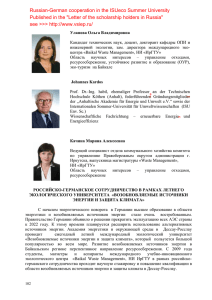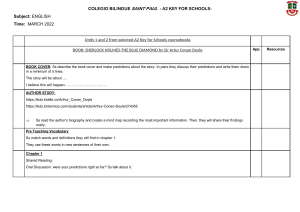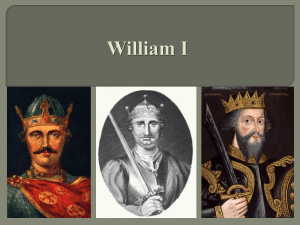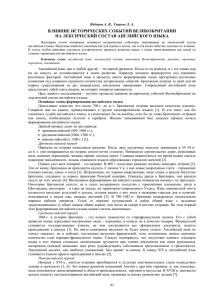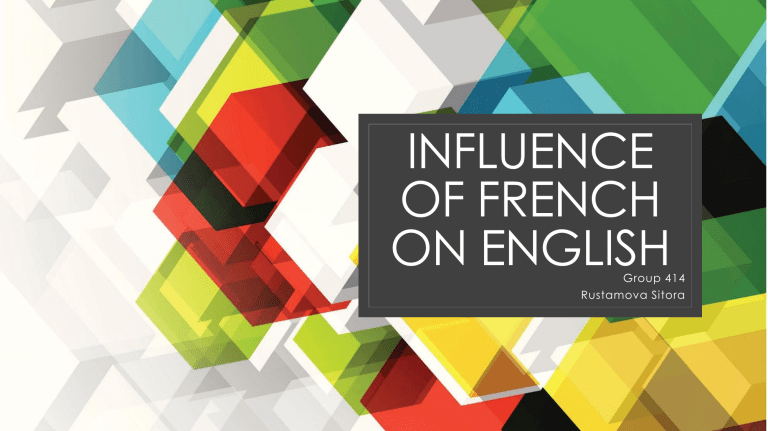
INFLUENCE OF FRENCH ON ENGLISH Group 414 Rustamova Sitora The influence of French on English ◦ The influence of French on English pertains mainly to its lexicon but also to its syntax, grammar, orthography, and pronunciation. Most of the French vocabulary in English entered the language after the Norman Conquest of England in 1066, when Old French, specifically the Old Norman dialect, became the language of the new AngloNorman court, the government, and the elites. That period lasted for several centuries until the aftermath of the Hundred Years' War (1337–1453). However, English has continued to be influenced by French. ◦ According to Laura K. Lawless, more than a third of current English vocabulary is of French origin. And according to the linguist Henriette Walter, words of French origin represent more than two-thirds of the English vocabulary 24.02.2022 The influence of French on English According to Laura K. Lawless, more than a third of current English vocabulary is of French origin. According to the linguist Henriette Walter, words of French origin represent more than twothirds of the English vocabulary 24.02.2022 Background Before 1066 Norman conquest of England and consequences Decline of French as first language in England 24.02.2022 Before 1066 ◦ In the early 11th century, Old English was not a single unified language but a dialect continuum that stretched from the southern English coast to the Forth estuary. However, a literary standard had emerged that was based around the West Saxon dialect spoken in the area centred on Winchester, the capital of Wessex.[3] Also spoken in the territory ruled by the Anglo-Saxons were the Celtic languages of Old Cornish, Old Welsh, and Cumbric, mainly in peripheral regions in which settlement by the Anglo-Saxons had been fairly minor, and Old Norse across a wide swath of territory in the North and the East Midlands. 24.02.2022 Norman conquest of England and consequences ◦ William II of Normandy landed at Hastings, Sussex on September 29, 1066. He deployed his men in the nearby area while he waited for King Harold Godwinson's troops. On October 14, exhausted by previous clashes with Scandinavians in the north and the long journey to Hastings, the English army lost the battle quickly and became disorganised after Harold was killed. After the defeat of the English, William claimed the throne as King of England on December 25, 1066. He was crowned William I of England and came to be known as William the Conqueror (Guillaume le Conquérant in French). ◦ The Norman Conquest marked the beginning of a long period of interaction between England and France. Noble English families, most of them of Norman origin, taught their children French or sent them to study in France. The early Norman kings spent more time in Normandy than in England. Royal marriages also encouraged the expansion of the French language in England. From Henry II Plantagenet and Eleanor of Aquitaine in the early 12th century to Henry VI and Margaret of Anjou in the 15th century, many English kings married French princesses, which kept French as the language of the English court for several centuries and strengthened its use in England overall. 24.02.2022 Decline of French as first language in England ◦ Throughout the late 11th and 12th centuries, the Norman nobility had ruled over both England and Normandy. However, in 1204, Normandy was lost to France and so the aristocracy began to associate more with an English identity. AntiFrench sentiment in England began to grow after Henry III invited relatives of his wife, Eleanor of Provence, to settle in England and bestowed lavish favours on them. Written works promoting the use of English in England began to appear around then, such as the Cursor Mundi. Meanwhile, the French spoken in England was stigmatised as a provincial variety by speakers from the Continent, particularly because the Anglo-Norman that was spoken by the elites had taken on a syntactical structure that resembled English. Some nobles had simply shifted to English entirely. ◦ In 1328, Charles IV of France died without an heir. Edward III of England and Philip VI of France disputed the French throne, and the Hundred Years' War ensued. The war provoked further negative feelings towards French in England, as it came to be seen as the language of the enemy. English had reasserted itself as a language of government and learning after over 200 years as a language of low prestige. In 1349, English became the language of instruction at the University of Oxford, which had taught in French or Latin. ◦ The use of English became widespread by the introduction of printing to England by William Caxton in 1476. Henry IV (1367-1413) was the first English king whose first language was English, and Henry V (1387-1422) was the first king of England to use English in official documents. 24.02.2022 Lexical ◦ The most notable influence of French on English has been its massive contribution to the English lexicon. It has been estimated that about a third of the words in English are French in origin; linguist Henriette Walter claims that this total may be as high as two thirds. Linguist Anthony Lacoudre has estimated that over 40,000 English words come directly from French and may be understood without orthographical change by French speakers. ◦ Albert C. Baugh and Thomas Cable note that "although this influx of French words was brought about by the victory of the Conqueror and by the political and social consequences of that victory, it was neither sudden nor immediately apparent. Rather it began slowly and continued with varying tempo for a long time. Indeed, it can hardly be said to have ever stopped. 24.02.2022 Lexical Baugh and Cable define several categories of early French borrowings: Government and social class (revenue, authority, realm, duke, count, marquis, servant, peasant) Church (religion, sermon, prayer, abbey, saint, faith, pray, convent, cloister) Law (justice, crime, jury, pardon, indict, arrest, felon, evidence) War (army, navy, battle, garrison, captain, sergeant, combat, defense) Fashion (gown, robe, frock, collar, satin, crystal, diamond, coat, embroidery) Food (feast, taste, mackerel, salmon, bacon, fry, mince, plate, goblet) Learning and medicine (paper, preface, study, logic, surgeon, anatomy, stomach, remedy, poison) 24.02.2022 Morphological and syntactical ◦ The gradual decline of the English singular pronouns thou and thee and their replacement with ye and later you have been linked to the parallel French use of vous in formal settings.[15] The ubiquity of -s to mark plurals in English has also been attributed to French influence, but the -s ending was common in English even prior to the Norman Conquest since as was the standard suffix form for plurals of strong masculine nouns in the nominative and accusative cases. It is possible that the dominance of that form over other endings such as -en was strengthened by the similarity of the French plural construction. ◦ Other suggestions include the impersonal one ("one does what one wants") and possessive phrases such as "the guitar of David", rather than "David's guitar", but similar forms are found in other Germanic languages, though, which casts doubt on the proposed French derivations.[17] Attempts have also been made to connect the increased use of gerunds towards the end of the Middle English period to the French gérondif form. ◦ They are fairly rare in English, but constructions that place the adjective after the noun (attorney general) are derived from French. ◦ English has adopted several prefix and suffix morphemes from French, including pre-, -ous, -ity, -tion, -ture, -ment, -ive and -able. They now stand alongside native English forms such as over-, -ish, -ly, -ness, -ship, -some, -less and -ful. 24.02.2022 Phonological The influence of French on English pronunciation is generally held to have been fairly minor, but a few examples have been cited: ◦ The use of non-word-initial stress patterns in some loan words of French origin ◦ The phonemisation of the voiced fricatives /z/ and /v/ (in Old English, they were allophones of their voiceless counterparts, /s/ and /f/, a pattern that can still be seen in some dialects of West Country English) ◦ The use of the diphthongs /ui/ and /oi/ 24.02.2022 Orthographic Innovations that then arose include the following: "qu-" instead of "cw-" (queen) "gh" instead of "h" (night) "ch" or "cch" instead of "c" (church) "ou" instead of "u" (house) "sh" or "sch" instead of "sc" (ship) "dg" instead of "cg" or "gg" (bridge) "o" instead of "u" (love, son; the "u" that was originally in such words was considered difficult to distinguish from the surrounding letters) doubling of vowels to represent long vowel sounds (see) doubling of consonants after short vowels (sitting) more use of "k", "z" and "j" 24.02.2022 Miscellaneous ◦ The effects of the Norman conquest had indirect influences on the development of the standardized English that began to emerge towards the end of the 15th century. The takeover of the elite class by the Normans, as well as their decision to move the capital of England from Winchester to London, ended the dominance of the Late West Saxon literary language.[22] London's growing influence led to the English spoken nearby, which was largely derived from the Mercian dialect of Old English, to become the standard written form, rather than that of West Saxon areas such as Hampshire, Wiltshire and Somerset. ◦ The Normans had a strong influence on English personal names.[23] Old English names such as Alfred, Wulfstan, Aelfric, Harold, Godwin and Athelstan largely fell out of fashion and were replaced by the likes of John, Peter and Simon as well as Normanized Germanic names like William, Richard, Henry, Robert, Roger and Hugh. 24.02.2022 Examples of English words of French origin Law and society ◦ Crown: from couronne, 12th c.[24] ◦ Custom: from custume, 12-13th c. ◦ Squire: from escuier, the bearer of the écu, bouclier, 12-13th c. ◦ Assizes: from assises, 13th c. ◦ Franchise: from franchise, 13th c. ◦ Joust: from joust, 13th c. Commerce ◦ Caterer: from Old Norman acatour, buyer, 11th c. ◦ Pay: from paier, appease, 12th c. ◦ Ticket: from estiquet, small sign, 12th c.[26] ◦ Purchase: from prochacier, "to try obtain (something)", 12th c. ◦ Rental: from rental, subject to an annual fee, 12th c. ◦ Debt: from det, 12th c 24.02.2022 Examples of English words of French origin Sport ◦ Champion: from champion, end 12th c. ◦ Sport: from desport, entertainment, 12th c.[26] ◦ Challenge: from chalenge, 12th c. ◦ Record: from record, 12th-13th c. ◦ To record: from recorder, 12th-13th c. Domestic life ◦ Aunt: from ante, 12th c. ◦ Butler: from bouteleur (12th c.), or bouteiller (14th c.), sommelier. ◦ Chamber: from chambre, 13th c. ◦ Curtain: from cortine, bed curtain, 13th c. ◦ Blanket: from blanquette, white sheet cover, 13th c. 24.02.2022 24.02.2022 THANKS FOR ATTENTION

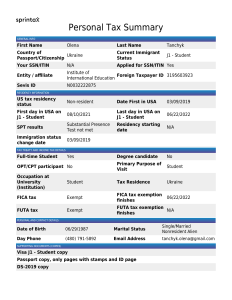
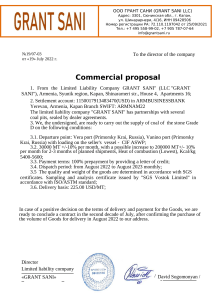
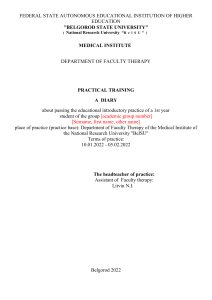
![Galaxy Villa sale kit [16-12-2019]](http://s1.studylib.ru/store/data/006234498_1-dd822349ddf25d41dd8938f1d9a6e401-300x300.png)
